Imran Ali Khan
Does 6G Need a New Waveform: Comparing Zak-OTFS with CP-OFDM
Jan 22, 2026Abstract:Across the world, there is growing interest in new waveforms, Zak-OTFS in particular, and over-the-air implementations are starting to appear. The choice between OFDM and Zak-OTFS is not so much a choice between waveforms as it is an architectural choice between preventing inter-carrier interference (ICI) and embracing ICI. In OFDM, once the Input-Output (I/O) relation is known, equalization is relatively simple, at least when there is no ICI. However, in the presence of ICI the I/O relation is non-predictable and its acquisition is non-trivial. In contrast, equalization is more involved in Zak-OTFS due to inter-symbol-interference (ISI), however the I/O relation is predictable and its acquisition is simple. {Zak-OTFS exhibits superior performance in doubly-spread 6G use cases with high delay/Doppler channel spreads (i.e., high mobility and/or large cells), but architectural choice is governed by the typical use case, today and in the future. What is typical depends to some degree on geography, since large delay spread is a characteristic of large cells which are the rule rather than the exception in many important wireless markets.} This paper provides a comprehensive performance comparison of cyclic prefix OFDM (CP-OFDM) and Zak-OTFS across the full range of 6G propagation environments. The performance results provide insights into the fundamental architectural choice.
Zak-OTFS over CP-OFDM
Aug 05, 2025Abstract:Zak-Orthogonal Time Frequency Space (Zak-OTFS) modulation has been shown to achieve significantly better performance compared to the standardized Cyclic-Prefix Orthogonal Frequency Division Multiplexing (CP-OFDM), in high delay/Doppler spread scenarios envisaged in next generation communication systems. Zak-OTFS carriers are quasi-periodic pulses in the delay-Doppler (DD) domain, characterized by two parameters, (i) the pulse period along the delay axis (``delay period") (Doppler period is related to the delay period), and (ii) the pulse shaping filter. An important practical challenge is enabling support for Zak-OTFS modulation in existing CP-OFDM based modems. In this paper we show that Zak-OTFS modulation with pulse shaping constrained to sinc filtering (filter bandwidth equal to the communication bandwidth $B$) followed by time-windowing with a rectangular window of duration $(T + T_{cp})$ ($T$ is the symbol duration and $T_{cp}$ is the CP duration), can be implemented as a low-complexity precoder over standard CP-OFDM. We also show that the Zak-OTFS de-modulator with matched filtering constrained to sinc filtering (filter bandwidth $B$) followed by rectangular time windowing over duration $T$ can be implemented as a low-complexity post-processing of the CP-OFDM de-modulator output. This proposed ``Zak-OTFS over CP-OFDM" architecture enables us to harness the benefits of Zak-OTFS in existing network infrastructure. We also show that the proposed Zak-OTFS over CP-OFDM is a family of modulations, with CP-OFDM being a special case when the delay period takes its minimum possible value equal to the inverse bandwidth, i.e., Zak-OTFS over CP-OFDM with minimum delay period.
Waveform for Next Generation Communication Systems: Comparing Zak-OTFS with OFDM
May 20, 2025

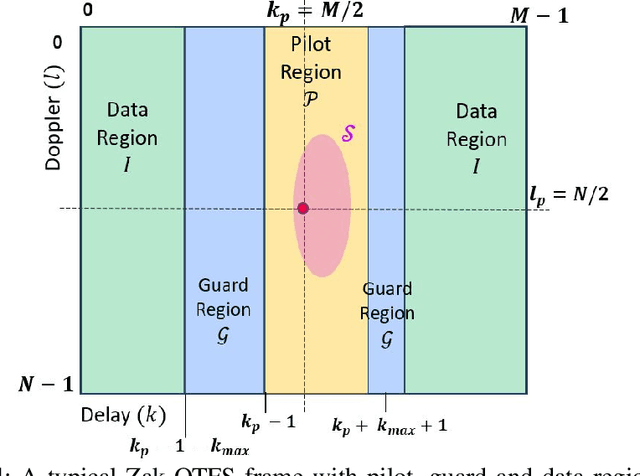
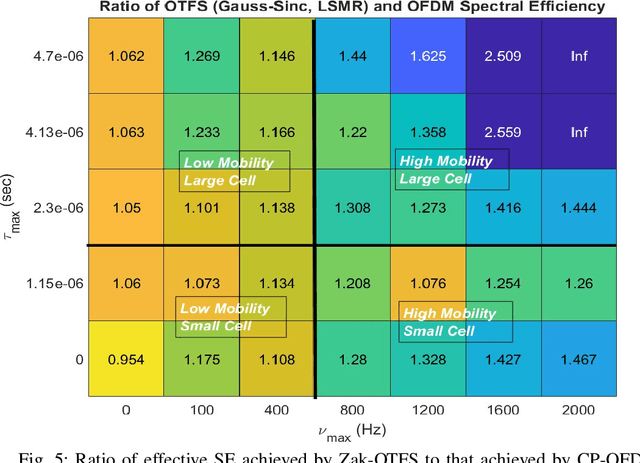
Abstract:Across the world, there is growing interest in new waveforms, Zak-OTFS in particular, and over-the-air implementations are starting to appear. The choice between OFDM and Zak-OTFS is not so much a choice between waveforms as it is an architectural choice between preventing inter-carrier interference (ICI) and embracing ICI. In OFDM, once the Input-Output (I/O) relation is known, equalization is relatively simple, at least when there is no ICI. However, in the presence of ICI the I/O relation is non-predictable and its acquisition is non-trivial. In contrast, equalization is more involved in Zak-OTFS due to inter-symbol-interference (ISI), however the I/O relation is predictable and its acquisition is simple. {Zak-OTFS exhibits superior performance in doubly-spread 6G use cases with high delay/Doppler channel spreads (i.e., high mobility and/or large cells), but architectural choice is governed by the typical use case, today and in the future. What is typical depends to some degree on geography, since large delay spread is a characteristic of large cells which are the rule rather than the exception in many important wireless markets.} This paper provides a comprehensive performance comparison of cyclic prefix OFDM (CP-OFDM) and Zak-OTFS across the full range of 6G propagation environments. The performance results provide insights into the fundamental architectural choice.
Delay-Doppler Signal Processing with Zadoff-Chu Sequences
Dec 05, 2024

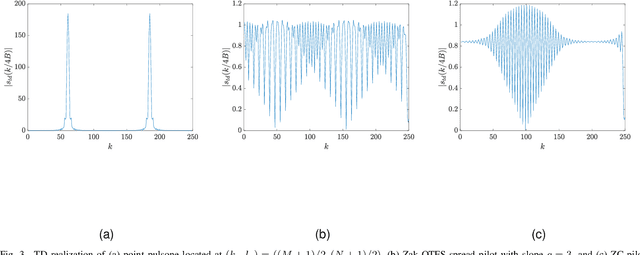

Abstract:Much of the engineering behind current wireless systems has focused on designing an efficient and high-throughput downlink to support human-centric communication such as video streaming and internet browsing. This paper looks ahead to design of the uplink, anticipating the emergence of machine-type communication (MTC) and the confluence of sensing, communication, and distributed learning. We demonstrate that grant-free multiple access is possible even in the presence of highly time-varying channels. Our approach provides a pathway to standards adoption, since it is built on enhancing the 2-step random access procedure which is already part of the 5GNR standard. This 2-step procedure uses Zadoff-Chu (ZC) sequences as preambles that point to radio resources which are then used to upload data. We also use ZC sequences as preambles / pilots, but we process signals in the Delay-Doppler (DD) domain rather than the time-domain. We demonstrate that it is possible to detect multiple preambles in the presence of mobility and delay spread using a receiver with no knowledge of the channel other than the worst case delay and Doppler spreads. Our approach depends on the mathematical properties of ZC sequences in the DD domain. We derive a closed form expression for ZC pilots in the DD domain, we characterize the possible self-ambiguity functions, and we determine the magnitude of the possible cross-ambiguity functions. These mathematical properties enable detection of multiple pilots through solution of a compressed sensing problem. The columns of the compressed sensing matrix are the translates of individual ZC pilots in delay and Doppler. We show that columns in the design matrix satisfy a coherence property that makes it possible to detect multiple preambles in a single Zak-OTFS subframe using One-Step Thresholding (OST), which is an algorithm with low complexity.
Zak-OTFS with Interleaved Pilots to Extend the Region of Predictable Operation
Aug 18, 2024Abstract:When the delay period of the Zak-OTFS carrier is greater than the delay spread of the channel, and the Doppler period of the carrier is greater than the Doppler spread of the channel, the effective channel filter taps can simply be read off from the response to a single pilot carrier waveform. The input-output (I/O) relation can then be reconstructed for a sampled system that operates under finite duration and bandwidth constraints. We introduce a framework for pilot design in the delay-Doppler (DD) domain which makes it possible to support users with very different delay-Doppler characteristics when it is not possible to choose a single delay and Doppler period to support all users. The method is to interleave single pilots in the DD domain, and to choose the pilot spacing so that the I/O relation can be reconstructed by solving a small linear system of equations.
Low Complexity Channel Estimation for OTFS Modulation with Fractional Delay and Doppler
Nov 11, 2021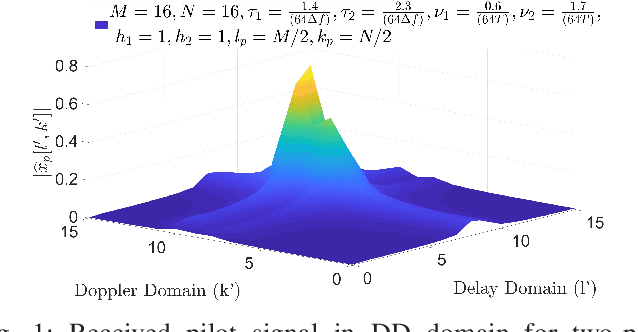

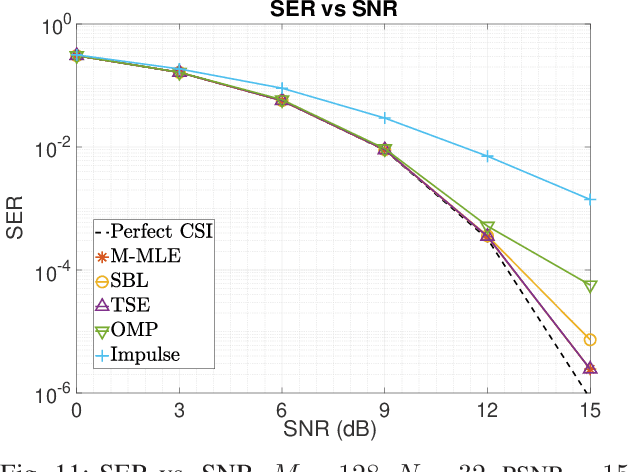

Abstract:We consider the problem of accurate channel estimation for OTFS based systems with few transmit/receive antennas, where additional sparsity due to large number of antennas is not a possibility. For such systems the sparsity of the effective delay-Doppler (DD) domain channel is adversely affected in the presence of channel path delay and Doppler shifts which are non-integer multiples of the delay and Doppler domain resolution. The sparsity is also adversely affected when practical transmit and receive pulses are used. In this paper we propose a Modified Maximum Likelihood Channel Estimation (M-MLE) method for OTFS based systems which exploits the fine delay and Doppler domain resolution of the OTFS modulated signal to decouple the joint estimation of the channel parameters (i.e., channel gain, delay and Doppler shift) of all channel paths into separate estimation of the channel parameters for each path. We further observe that with fine delay and Doppler domain resolution, the received DD domain signal along a particular channel path can be written as a product of a delay domain term and a Doppler domain term where the delay domain term is primarily dependent on the delay of this path and the Doppler domain term is primarily dependent on the Doppler shift of this path. This allows us to propose another method termed as the two-step method (TSE), where the joint two-dimensional estimation of the delay and Doppler shift of a particular path in the M-MLE method is further decoupled into two separate one-dimensional estimation for the delay and for the Doppler shift of that path. Simulations reveal that the proposed methods (M-MLE and TSE) achieve better channel estimation accuracy at lower complexity when compared to other known methods for accurate OTFS channel estimation.
 Add to Chrome
Add to Chrome Add to Firefox
Add to Firefox Add to Edge
Add to Edge